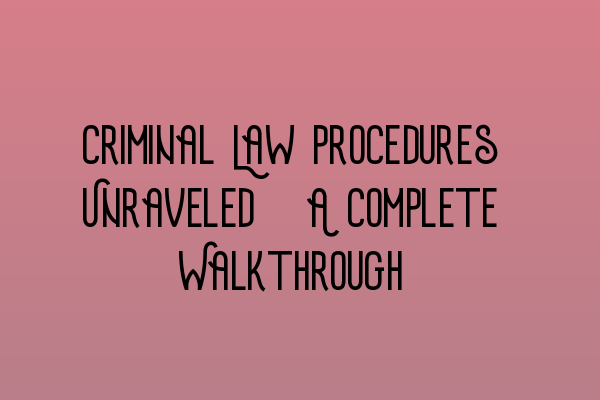Criminal Law Procedures Unraveled: A Complete Walkthrough
Are you preparing for your SQE Criminal Law & Practice Law UK exams? Understanding the various criminal law procedures is crucial for success. In this comprehensive guide, we will walk you through the key steps involved in criminal law procedures, from arrest to trial. By the end of this article, you’ll have a solid understanding of the entire process.
1. Arrest and Detention
It all begins with an arrest. Understanding the circumstances under which a person can be lawfully arrested is essential. Furthermore, you need to be familiar with the legal requirements for detention and the rights of the arrested person. For more practice, check out our SQE 1 Practice Exam Questions.
2. Police Investigation
Once an arrest is made, the police start their investigation. This includes gathering evidence, interviewing witnesses, and conducting forensic examinations. As a solicitor, it’s important to understand the legal boundaries within which the police can operate during their investigation process. Our SQE 1 Practice Mocks FLK1 FLK2 will help you prepare for this aspect.
3. Charging and Bail
After the investigation, the decision to charge the suspect is made. Understanding the factors that influence charging decisions is crucial. Additionally, being aware of the bail process and the criteria for granting bail is vital. Our SQE 2 Preparation Courses will provide you with in-depth insights on this topic.
4. Pre-trial Procedure
Before a trial begins, several pre-trial procedures take place. These include arraignment, disclosure of evidence, and plea negotiations. Familiarize yourself with these procedures to effectively represent your clients. Our SQE 1 Preparation Courses will equip you with the necessary knowledge.
5. Trial
The trial is the cornerstone of criminal law procedures. Understanding the rules of evidence, cross-examination techniques, and how to present a convincing argument is essential. Stay updated with the latest SRA SQE Exam Dates to plan your studies effectively.
6. Sentencing and Appeals
Once a verdict is reached, the court proceeds to impose a sentence. Understanding the sentencing guidelines and available options is crucial for providing the best advice to your clients. Moreover, knowing the grounds for appealing a conviction or sentence is essential. Stay updated with our future articles on this topic.
By unraveling the criminal law procedures and following this complete walkthrough, you will be well-prepared for your SQE Criminal Law & Practice Law UK exams. Remember to practice with our recommended resources for a comprehensive understanding of the subject. Good luck!
